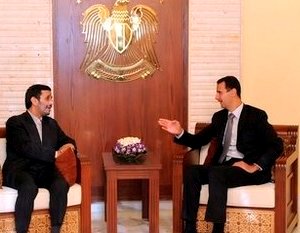 Syria, Iran’s Arab ally, is driving to build a grandiose new energy alliance across the Middle East and beyond aimed at thrusting the economically troubled state back into a regional leadership role.
Syria, Iran’s Arab ally, is driving to build a grandiose new energy alliance across the Middle East and beyond aimed at thrusting the economically troubled state back into a regional leadership role.
President Bashar Assad calls his vision the Four Seas Strategy to link the Mediterranean, the Caspian Sea, the Black Sea and the Persian Gulf into an energy network.
This eastward-looking strategy is intersecting with China’s push westward in quest of oil, natural gas, raw materials and markets and converges on the Caspian, a major energy-producing zone.
“Given the rising instability of Middle East energy supplies, the Caspian Basin has emerged in prominence as an alternative resource for the world’s growing energy consumers,” says Christina Y. Lin, a visiting fellow at the Washington Institute for Near East Policy.
The region, which lies between Iran and Russia, holds the world’s largest reservoir for oil and natural gas outside the Persian Gulf and Russia.
“The interplay of China’s growing footprint in the Caspian region via its modern Silk Road — reinforced by Syrian President Assad’s nascent ‘Four Seas Strategy’ — will have important implications for the United States, the European Union and other allies,” Lin wrote in a survey for the Jamestown Foundation, a Washington think tank.
China has been stepping up efforts to build strategic energy links with the Middle East, particularly Saudi Arabia, as U.S. influence in the region wanes.
In 2009, the kingdom exported more oil to China than it did to the United States, its traditional ally.
Beijing wants to build up political and military influence in the region as well, in part to protect the vulnerable sea lanes that carry gulf oil to China.
Chinese moves into the Caspian zone are “part of China’s overall Silk Road strategy to diversify energy dependence on the unstable Gulf region” — just as the Americans are doing — “and build overland routes to hedge against maritime supply disruptions from the gulf,” Lin wrote.
Assad’s ambitious strategy, which he unveiled in 2009, hinges heavily on Syria’s mushrooming relations with neighboring Turkey.
A decade ago the two countries were on the brink of war. Now, in a constantly changing geopolitical landscape, they are firm allies.
But Syria’s ramshackle economy has been flat-lining for years, with 10 percent unemployment and a crippling inflation rate of 14.5 percent.
So “Turkey has taken on a critical dimension,” said Webster Brooks of the Center for New Politics and Policy in Washington.
“At the center of Assad’s strategy is Syria’s economic relationship with Turkey and connecting the nation’s oil and gas infrastructure to the region’s expanding energy pipeline networks.”
To get the ball rolling, Ankara and Damascus plan to integrate their gas grids and link them with the Arab Gas Pipeline that starts in Egypt and serves Jordan, Syria, Lebanon and Turkey.
Plans to build a new AGP link between Syria and Turkey were signed in 2009, with completion expected this year.
“Assad’s enlarged vision of Syria’s role as a strategic energy transiting role is to link the nation’s oil and gas pipeline network to the Nabucco pipeline that will carry oil from the Caspian Sea to Turkey and on to Europe,” Brooks observed.
Assad signed a free trade agreement with Turkey in 2007 and trade is expected to hit $5 billion a year by 2012. He has also signed agreements with Armenia and Azerbaijan.
Assad has also revived negotiations with Syria’s eastern neighbor, Iraq, which is driving to challenge Saudi Arabia as the top oil producer, to reopen an oil pipeline running from Kirkuk to Syria’s Mediterranean port of Banias.
That pipeline, with a capacity of 200,000 barrels per day, was closed in 1979 when Syria and Iraq were feuding. Syria wants to build a second pipeline, with a 1.4 million bpd capacity.
Despite Syria’s economic weakness and the hostility of the United States, Assad, through his alliance with Iran, has been able to revive Damascus’ political clout in recent years and to restore its supremacy in Lebanon after a decade if decline.
Assad faces an uphill struggle for his ambitious economic strategy but as Iraq’s formidable energy resources come into play they will enhance his vision.
“The Obama administration should open its eyes and take not of the rising tide between the four seas,” said Brooks. UPI

Leave a Reply
You must be logged in to post a comment.